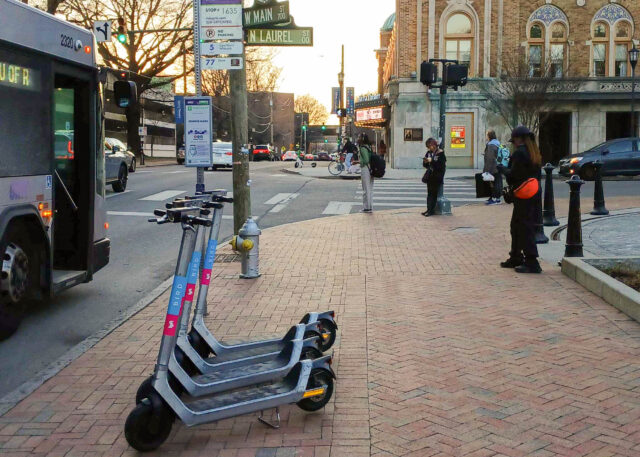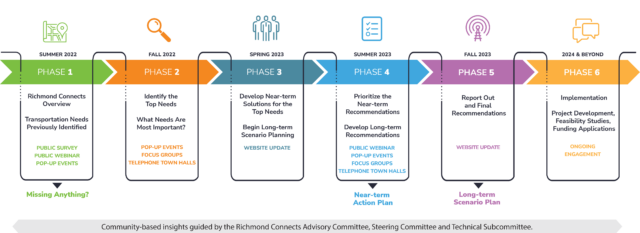Richmond Prioritizes Equity in Transportation With Program Expansion
by Odochi Akwani, Writer and Content Manager
May 15, 2025
The city expanded its Equity Zone Program to more neighborhoods, offering discounted Spin scooter rides through a community-driven transportation plan.

The City of Richmond is reimagining how residents move through their neighborhoods with equity as the driving force. The city is working to close mobility gaps and ensure all residents have access to reliable transportation options, including shared micromobility. In partnership with Richmond’s Office of Equitable Transit and Mobility (OETM), Spin, the city’s contracted micromobility operator for shared scooters, is supporting the expansion of Richmond’s Equity Zone Program — an initiative designed to reduce transportation barriers in historically underserved neighborhoods.
Less than a year old, the Equity Zone Program was previously limited to two neighborhoods but now covers five zones: Fairfield, Mosby, Whitcomb, Hillside, and Gilpin. These areas were carefully selected through extensive community engagement through Richmond Connects, the city’s equity-centered process to identify and prioritize multimodal transportation projects.
The city spent more than two years creating the Richmond Connects framework and the equity zone expansion work is an example of how they are putting their transportation plan into action.
“I believe that Richmond is unique both in our commitment to equitable transportation and the extent to which we are implementing this program,” says Anna Bon-Harper, transportation planner with the Office of Equitable Transit and Mobility in Richmond. “I know that our program and the success we’ve had so far have been used as an example when other cities are considering bringing this program to their area. We are dedicated to both promoting alternative modes of transportation and providing affordable access to those modes.”
According to Ernest Moore, management analyst with the OETM, the community engagement initiative included surveys that reached more than 20,000 residents.
COMMUNITY ENGAGEMENT TIMELINE

Encouraging new, consistent riders is part of this expansion. Through Spin Access Richmond, residents who pick up a scooter in one of the equity zones receive 50% off their ride. Now, they also receive an email allowing them to sign up for discounted rides no matter where they pick up scooters in the future if they reside within one of the five equity zones.
“Transportation cost is one of the highest burdens that families face, both in the city and in the whole country, so anything we can do to alleviate that helps our low-income families,” says Bon-Harper.
Despite the scooter system being run by an outside company and the local bike share system (RVA Bike Share) run by the city, the two organizations work together to promote multimobility and reach the goals laid out in Richmond Connects. Several RVA Bike Share stations lie within or adjacent to the equity zones, including Fairmont, Blackwell, Carter Jones Park, and Abner Clay Park stations. With this expansion, the City of Richmond has begun tracking Spin scooter ridership in these zones, finding that 10–11% of rides are coming from these equity zones.
Moore sees this impact firsthand.
“I live in the city in Blackwell, and I see an intergenerational engagement with the scooters, bike sharing, and all of the modes of transportation that we offer. I’m excited when I see this is helping someone go to work,” says Moore.
Community engagement will be key to the success of the program. The City of Richmond plans to educate each neighborhood about this new program through upcoming community events as spring weather continues to warm up across the region. The office is spreading the word through press releases, public events like the Music at Main Street Station, the Department of Public Works’ Speed Management Symposium, and direct engagement with faith communities.
Richmond is an example of how a city can use active transportation to invest in its communities. As the program grows and ridership data from equity zones increases, the city’s commitment to multimodal, equitable transportation is not just being planned, it’s being built.
___________________________________________________________________________________________
The Better Bike Share Partnership is funded by The JPB Foundation as a collaboration between the City of Philadelphia, the National Association of City Transportation Officials (NACTO), and the PeopleForBikes Foundation to build equitable and replicable bike share systems. Follow us on LinkedIn, Facebook, Twitter, and Instagram, or sign up for our weekly newsletter.
Have a question or a story idea? Email odochi@peopleforbikes.org.
